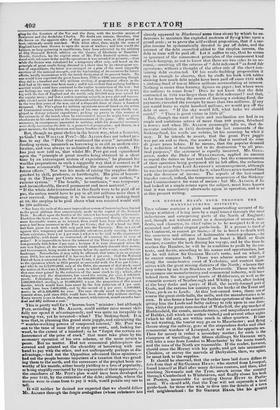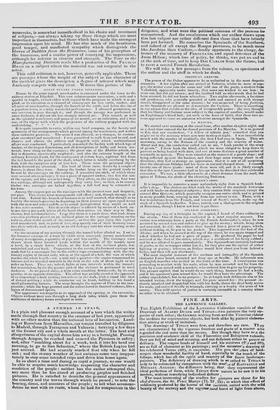SIR GEORGE HEAD'S TOUR THROUGH THE MANUFACTURING DISTRICTS.
THIS volume contains a plain and unpretending account of the things worthiest of being seen by a rapid tourist through the most industrious and enterprising parts of the North of England; and, though not without merit as a deseription of scenery, inci- dents, and character, its chief value is to be assigned to it as an animated and rather elegant guide-book. It' a person is tired of the Continent, or cannot go there,—if he is bored to death with the sameness and silliness of fashionable watering-places,—let him buy this volume, put himself on board a Hull or Goole steamer, examine the book during his voyage, and by the time he reaches the Humber, he will be in condition to profit by its con- tents, and decide, according to his means and opportunities, how far lie will follow Sir GEORGE HEAD's route, and on which, if he cannot compass both. Those who admire nature will pass along the ocean-beaten coast of Yorkshire, and content them- selves with the great mining districts of the North; whence they may return by sea from Stockton or Newcastle. Those who wish to examine our manufacturing and commercial industry, will leave behind them the sea-gained tracts of Ilolderness, as well as the romantic scenery of Scarborough and Whitby ; and, after looking at the busy docks and quays of Hull, the newly-formed port of Goole, and the curious low country on the banks el' the Trent and Ouse, push on to Leeds. At this last-named town, there are of course the great cloth-halls, the mills, and the manufactories to be seen. It also forms a base for the further operations of the tourist; giving him the Leeds and Selby railway to ride upon in one direc- tion, whilst the great corn-market of Wakefield, the pig-market of Huddersfield, the canals, manufactories, and magnificent environs of Halifax, (all which our author visited,) and several other sights (which he did not), are within reach in other quarters. If time be not wanting, the tourist may go on to Manchester ; and flying thence along the railway, gaze at the stupendous docks and other commercial wonders of Liverpool, as well as at the opposite sea. Thus far money is rather a secondary matter; for such is the cheapness of travelling, that fifteens shillings, Sir GEORGE Says, will take a man from London to Manchester by the route traced, and the inns of the North are reasonable. If the reader, however, should cross the Mersey with his guide, and get into aristocratic Cheshire, or survey the marvels of Derbyshire, then, we opine, he must look to the supplies. It should be observed, that the order here laid down differs in lobo from that of Sir GEORGE HEAD; who started from Liverpool, found himself at Hull after many devious courses, and then, after reaching Newcastle and the Tyne, struck across the country through Cumberland to Whitehaven, and finally closes his book at Preston, memorable for sending Orator HUNT to Parlia- ment. We should add, that the Tour will not supersede a local guide-book for those who wish to dive into the details of a town an neighbourhood for Sir Gfiafiaiilkan, 1J1 Ais greater Damesake, is somewhat immethodical in his choice and treatment of subjects,—not always taking up those things which are most important in themselves, but those which have made the strongest impression upon his mind. Ile has also much of the heartiness, good temper, and unaffected sympathy which distinguish the blower of Bubbles from the Brunnens, some of his perception of the humorous, and a similar power of conveying his impressions, although far inferior in vivacity and strength. The Tour in the Munofucturing Districts reads like a production of Sir FRANCIS HEAD UR a subject where the material was not congenial to the artist.
This cold criticism is not however, generally applicable. There are passages where the weight of the subject or the character of the incident gives the desmiption a degree of interest which may fearlessly compete with olly rivah. Witness this picture of the
GnEAT NNEL uNnElt 1.1VVRIM01..
hence, by the great tunnel, merchandise is conveyed under the town to the railway station at Edgehin. This vast subterraneous excavation, a mile and a quartet in length, viewed either with regard to the purposes to which it is or its execution as a channel of conveyanee for live cattle, timber, and all sorts of merchandise, thruugh the bowels of the mils and below the site of a populous town, is a truly wonderful performance. I obtained permission, on one occasion, to pates Borough it ; and though the passage was performed in
utter darkness, it did not the lees strongly interest me. This tunnel, as well as the splendid warehousee and quays at its mouth, are an bulication, and a true one, of the vigour with which the prejectots of the railway grappled with the undertaking. • * • • It is quite impossible to enter, within my brief compass, on the beauty and symmetry of the arrangements which prevail among the warehouses, and within these extensive premises. The scene I was allowed, as a stranger, to contem- plate unroticeil and unmolested : 1 was permitted to walk from end to end, and observe and admire the address and despat a with which affairs were conducted. I pat tieularly iemarked the facility with which logs of timber, of the largest dimension's and all descriptions of bulky and heavy ilia- teriale, were slung on the carriages; the great size uf the Dobbin-wheeln, ten feet in diameter, occasionally empinyed ; and also the extreme length of the ordinary Liverposi cart, for the conveyance of cotton bogs, eighteen feet from the tail board to the point of the shaft, which latter is totally overhung by the body with the exception only of four feet. These were the principal objects which diverted my attentiou. The load of these carts, drawn by a couple of horses, is Mem three tons. Among the timber lying on the ground ready to be sent by the carriages on the railway. I measured one stick, of which there were several others as large ; it was a piece of squared timber, two feet the side of the equare, and fifty -seven feet long. They allow, 01I the railway, four tons to a carriage, although not uufrequently they carry live ; so that, as to convey timber two carriages are lashed together, a full load may be estimated at ten tons.
Attu ... g the cargoes put on the carriages with the greatest ease and despatch, are pigs. This shows what management will effect ; and, though strange, is at least true. Indeed this branch of business is so well assorted, that though as to locality the animals previous to departing on their journey are upon equal terms with the men and merchandi*, as to actual juxtaposition they might as well
be five asunder. This dcsirahle object is effected by means of a back en- trance into a pig-yard, where all the herds that arrive, on their way to Man- chester, find accommodation. Flop this there is a small door, that leads down a wooden platform placed on an inclined plane to die carriage standing on the railway, close to the mouth of the runnel ; so that the Ike enjoy this right of road unmolested, and, in point of fact, step i icily out of their drawing-room into their vehicle, each as easily as an old duwaget into her chair waiting in the vestibule.
Oil the occasion of my passing through the tunnel before alluded to, I sat in the foremost carriage of a train by which were conveyed, among merchandise
of many descriptions, a quantity of pigs awl live cattle. Thoi carriages were drawn about three hundred yards within the mouth of the tunnel, upon a level, by a single horse, which, at the foot of the Melined plane, was unhitched and sent hack. Preparatory to the ascent, the foremost carriage was made fast by a messenger line to the endless rope communicating with the sta- tionary engine ut the east end; when, at the signal of a bell, the wire of which reaches the whole length—viz. a mile and a quarter—the engine commenced its labours and we trundled onwards in the dark at the rate of about eight or ten miles an hour. There are, indeed, lights at rare intervals within the tunnel ; but nevertheless, by far the greater part of the distance is performed in total darkness. As we ;miser' along, a train came rumbling downwards, by its own gravity, in an opposite direction. The effect was awfully grand at the approach of so stupendous a body rushing towards us in the dark, with a sound like that of distant artillery ; while its conductor sat in front, holding in his hand a small glimmering lantern. The scene brought the regions of Pluto to the ima- gination; while the hogs grunted and the calves lowed in funereal cadence, like a legion of discontented spirits.
The appearance was singular as we approached the opening at the extremity. Objects without were seen through a long dark tube, which gave them the wad:mice of shadowy forms enveloped in mist.



























 Previous page
Previous page